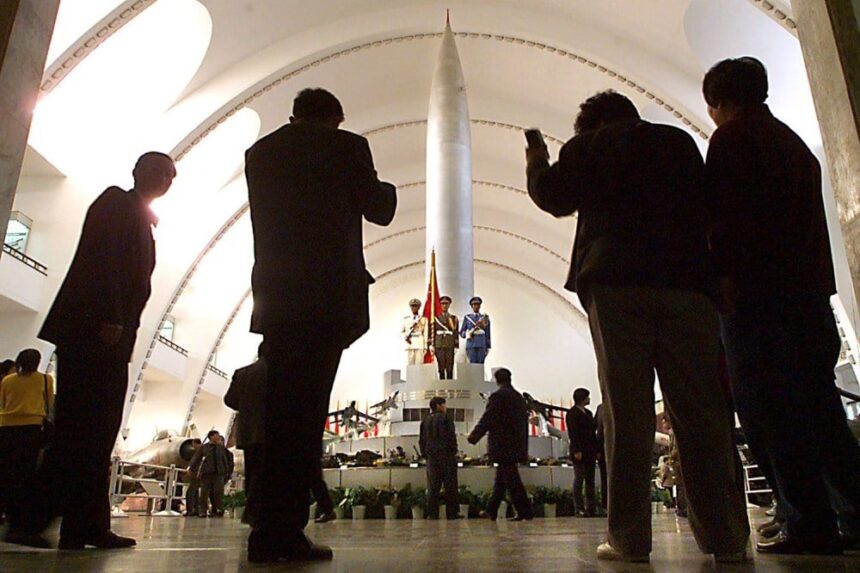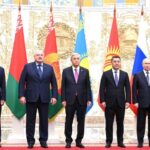Summary by Geopolist | Istanbul Center for Geopolitics:
The article from Foreign Policy discusses China’s nuclear weapons policy, particularly its stance on deterrence and the No First Use (NFU) policy. China has long upheld an unconditional NFU policy, meaning it commits to not using nuclear weapons first under any circumstances. This policy aims to reduce the role of nuclear weapons in international security and mitigate nuclear arms competition and proliferation.
Recently, China has reiterated its commitment to the NFU policy, emphasizing its importance in any nuclear weapons discussion. However, this position diverges significantly from U.S. nuclear policy, which has not adopted a similar stance. Despite this divergence, there is an opportunity for dialogue between the U.S. and China on substantive and mutually beneficial issues related to nuclear arms control without requiring the U.S. to adopt an NFU policy.
The article also highlights that China’s NFU policy faces credibility challenges due to internal and external factors, which impact its effectiveness and international perception.
Read the full article below.
The nuclear taboo, a term coined by political scientist Nina Tannenwald in the 1990s, has become one of the most influential ideas in contemporary international relations, appearing not only in the pages of major scholarly publications but also in statements from the United Nations secretary-general and lectures from Nobel winners. It holds that in the wake of World War II, the prospect of using nuclear weapons became so utterly and universally opprobrious that leaders will shy away from the option even when it would be strategically sensible.
The nuclear taboo, a term coined by political scientist Nina Tannenwald in the 1990s, has become one of the most influential ideas in contemporary international relations, appearing not only in the pages of major scholarly publications but also in statements from the United Nations secretary-general and lectures from Nobel winners. It holds that in the wake of World War II, the prospect of using nuclear weapons became so utterly and universally opprobrious that leaders will shy away from the option even when it would be strategically sensible.
The nuclear taboo thesis has been challenged by research in countries such as the United States, France, the United Kingdom, and Israel. Yet, for many, one country is still seen as the standard-bearer for the taboo in the 21st century: China. While this may come as a surprise to hawks in Washington, numerous scholars of Chinese politics have argued that China’s distinctive cultural traditions predispose its leaders and citizens toward moderation in war. John Fairbank, the father of modern China studies in the United States, observed in 1974 that China’s Confucian culture encourages its leaders and people to prioritize the “downgrading of warfare,” writing, “The moral absolute is all on the side of peace.”
Such statements reflect an assumption that culturally informed preferences shape states’ strategic behavior. As political scientist Alastair Iain Johnston put it, if Chinese cultural traditions uniquely stress “nonviolent political or diplomatic means to deal with adversaries,” China’s strategy in wartime should have a “distinctive minimally violent character.” One might thus presume that the use of nuclear weapons, which would likely kill hundreds of thousands of noncombatants, should be downright anathematic to adherents of such a culture.
Many analysts have latched onto this reasoning to argue that an especially intense normative prohibition against nuclear use prevails in China and that the country “does not consider nuclear weapons to have a military use.” Beijing’s long-standing adherence to a nuclear no-first-use policy seemed to lend credence to such claims. In Tannenwald’s words, this policy is designed to communicate “the purely defensive nature” of China’s nuclear arsenal and “the spirit of ‘peaceful coexistence’ to which China is committed.” Historically, U.S. policymakers have intermittently acknowledged this aspect of Beijing’s nuclear posture. A 1987 Defense Intelligence Agency report, for instance, observed that “China’s nuclear strategy is defensive in nature. It is a strategy of minimal deterrence.” Public opinion polls showing that nearly 90 percent of Chinese citizens believe “countries should never use nuclear weapons in warfare” have reinforced the view in some expert communities that despite its growing arsenal, if the nuclear taboo persists in any of today’s nuclear states, it would be China.
But new evidence suggests there’s good reason to be skeptical of this hypothesis.
In the fall of 2022, we conducted an experimental study in mainland China to systematically scrutinize the country’s widespread nuclear attitudes for the first time. We asked a sample of 2,283 Chinese citizens—balanced on gender and age to approximate census representation—to consider a hypothetical military conflict between China and an unnamed adversary in the South China Sea under the shadow of potential U.S. intervention. The scenario depicted severe losses for the People’s Liberation Army, with Chinese leaders contemplating the use of nuclear weapons against the opposing country’s cities to expedite the war’s conclusion before the United States became involved. After being randomly assigned to variations of this scenario, respondents were asked to indicate whether they would prefer using nuclear weapons or continue the war without them, as well as the extent to which they would approve of a governmental decision to use the weapons.
The results unveiled new information about the public’s attitudes toward wartime nuclear use. Consistent with previous surveys, the average respondent indicated a strong personal preference against using nuclear weapons in wartime. Most respondents explained their opposition in ethical and humanitarian terms, offering statements such as, “The people [in the enemy country] are innocent. … Not to mention there are children in there as well.” This tendency contrasts markedly with relevant findings from the United States, where even individuals who express anti-nuclear preferences tend to ground their position in consequentialist rationales—for example, the desire to avoid setting a dangerous precedent that could heighten the risk of future nuclear use against the United States.
Although respondents were widely opposed to nuclear use on a personal level, the overall findings did not support the notion of a widespread normative prohibition against the government’s decision to use nuclear weapons in war. Although, at baseline, 73 percent of respondents preferred not to employ nuclear weapons against enemy cities, 54 percent of respondents nonetheless approved of their leaders’ decision to do so. Remarkably, even in heavily skewed variants of the baseline scenario that emphasized the harrowing potential consequences of a nuclear strikes—including 2 million enemy civilian fatalities and provoking a disproportionate U.S. nuclear retaliation—more than 40 percent of respondents expressed political support for the government’s decisions.
These findings indicate that most ordinary Chinese citizens are willing to give their leaders the benefit of the doubt on decisions related to nuclear weapons use. This isn’t unique to China—far from it. Chinese views on the matter parallel those found among Americans. One important study, for example, found that despite many respondents’ personal opposition to nuclear use, 59 percent of the U.S. public would be willing to approve of a presidential decision to kill 2 million Iranians with nuclear weapons in a hypothetical war if the alternative were to risk the lives of 20,000 U.S. troops in a ground invasion.
It’s possible that decision-makers in Beijing hold different views about nuclear use than ordinary citizens. Still, we should bear in mind that the nuclear taboo is typically understood as a widely shared standard of acceptable behavior regarding the wartime role of nuclear weapons. The fact that members of the public—far removed from decision-making authority—would be willing to offer substantial support for the government’s use of nuclear weapons should, at minimum, lead us to question whether a nuclear taboo will prevail among elites in moments of crisis.
It’s also worth noting that our study presented respondents with a conflict scenario involving the South China Sea, which is much less politically and emotionally salient for the Chinese public than an obvious alternative scenario involving a fight over Taiwan. It stands to reason, then, that these results represent only a conservative estimate of how fragile the nuclear taboo is in China. If average Chinese citizens are willing to endorse nuclear use in a relatively low-salience scenario, they would be even more likely to do so in a real-world conflict over a “sacred commitment” of the Chinese nation.
These findings, however bleak, offer valuable insights for U.S. policymakers to consider during a future U.S.-China military crisis. One can easily imagine a future conflict in which policymakers and pundits clamor for Washington to seriously escalate and inflict Beijing with a decisive defeat, believing that Chinese leaders will deem it “unthinkable” to turn to nuclear weapons to rescue the situation. Given the stakes of getting this wrong, it would be abjectly foolish to put stock into the notion that China’s cultural preferences are so strong that Beijing would really hold back from contemplating nuclear use in such a scenario. Indeed, as a 2022 war game found, a U.S.-China clash over flash points such as Taiwan could “very well go nuclear,” particularly if Beijing’s leaders come to believe that nuclear weapons could help stave off a decisive U.S. intervention.
Nuclear escalation remains a serious possibility in a future U.S.-China conflict. Averting such an outcome will have very little to do with supposed cultural characteristics or a nuclear taboo and everything to do with leaders’ determination to step away from it during crises—despite their ability to secure broad-based public support for it and despite the political risks of being accused of appeasement. Leaders in both Washington and Beijing would do well to dispense with any fantasy that normative qualms on either side—culturally informed or otherwise—would interrupt war’s tendency toward the nuclear extreme. Only the exercise of political discipline and restraint can do that.
By Changwook Ju
Source: Foreign Policy







